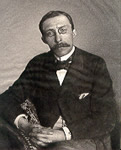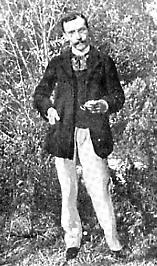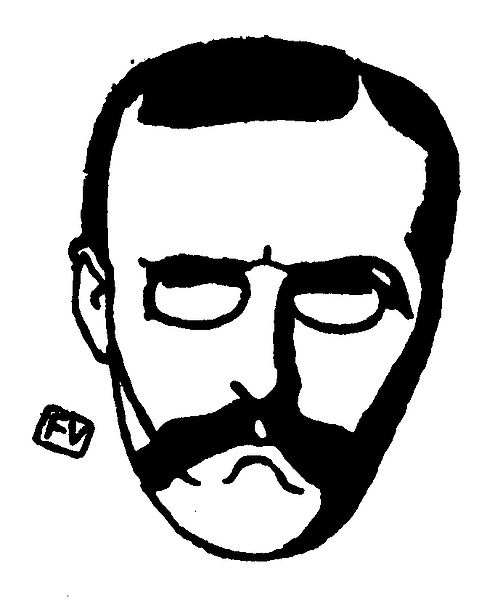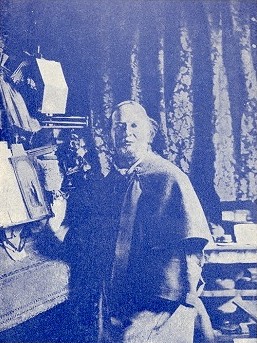<Back to Index>
- Writer Albert Victor Samain, 1858
- Writer and Critic Remy de Gourmont, 1858
PAGE SPONSOR



Albert Victor Samain (3 April 1858 - 18 August 1900) was a French poet and writer of the Symbolist school.
Born in Lille, his family were Flemish and had long lived in the town or its suburbs. At the time of the poet's birth, his father, Jean - Baptiste Samain, and his mother, Elisa - Henriette Mouquet, conducted a business in "wines and spirits" at 75 rue de Paris. Samain's father died when he was quite young; it was necessary for him to leave school and seek a trade. He moved to Paris in around 1880, where his poetry won him a following and he began mixing with avant garde literary society, and began publicly reciting his poems at Le Chat Noir. His poems were strongly influenced by those of Baudelaire, and began to strike a somewhat morbid and elegiac tone. He also was influenced by Verlaine; his works disclose a taste for indecisive, vague imagery. Samain helped found the Mercure de France, and also worked on the Revue des Deux Mondes.
Samain published three volumes of verse: Le jardin de l'infante (1893), which made him famous; Aux flancs du vase (1898) and Le Chariot d'or (1901). His poetic drama Polyphème was set to music by Jean Cras. Samain died of tuberculosis.
Camille Saint - Saëns set poems of Samain to music: "Six Mélodies sur des poésies d'Albert Samain" op.31 (1902 - 1906; orchestrated 1921)
- Je rêve de vers doux et d'intimes ramages,
- De vers à frôler l'âme ainsi que des plumages,
- De vers blonds où le sens fluide se délie
- Comme sous l'eau la chevelure d'Ophélie,
- De vers silencieux, et sans rythme et sans trame
- Où la rime sans bruit glisse comme une rame,
- De vers d'une ancienne étoffe, exténuée,
- Impalpable comme le son et la nuée,
- De vers de soir d'automne ensorcelant les heures
- Au rite féminin des syllabes mineures.
- De vers de soirs d'amour énervéls de verveine,
- Où l'âme sente, exquise, une caresse à peine...
- Je rêve de vers doux mourant comme des roses.
-
-
-
-
- --Le jardin de l'infante
-
-
-

Remy de Gourmont (April 4, 1858, Bazoches - au - Houlme, Orne - September 27, 1915, Paris) was a French Symbolist poet, novelist, and influential critic. He was widely read in his era, and an important influence on Blaise Cendrars. (The spelling Rémy de Gourmont is incorrect, albeit common and used by Ezra Pound in translations of his work.)
De Gourmont came from a publishing family from Cotentin. He was the son of Count Auguste - Marie de Gourmont and his countess, born Mathilde de Montfort. In 1866 he moved to a manor close to Villedieu near La Manche. He studied law at Caen, and was awarded a bachelor's degree in law in 1879; upon his graduation he moved to Paris.
In 1881, de Gourmont was employed by the Bibliothèque nationale. He began to write for general circulation periodicals such as Le Monde and Le Contemporain. He took an interest in ancient literature, following the footsteps of Gustave Kahn. During this period, he also met Berthe Courrière, model for, and heir of, the sculptor Auguste Clésinger, with whom he formed a lifelong attachment, he and Berthe living together for the rest of their lives.
De Gourmont also began a literary alliance with Joris-Karl Huysmans, to whom he dedicated his prose work Le Latin mystique (Mystical Latin). In 1889 de Gourmont became one of the founders of the Mercure de France. Between 1893 and 1894 he was the co-editor, along with Alfred Jarry, of L'Ymagier, a magazine dedicated to symbolist wood carvings. In 1891 he published a polemic called Le joujou patriotisme (Patriotism, a toy) in which he argued that France and Germany shared an aesthetic culture and urged a rapprochement between the two countries, contrary to the wishes of nationalists in the French government. This political essay led to his losing his job at the Bibliothèque nationale, despite Octave Mirbeau's chronicles.
During this same period, de Gourmont was stricken with lupus vulgaris. Disfigured by this illness, he largely retired from public view appearing only at the offices of the Mercure de France. In 1910, de Gourmont met Natalie Clifford Barney, to whom he dedicated his Lettres à l'Amazone (Letters to the Amazon).
De Gourmont's health continued to decline and he began to suffer from locomotor ataxia and be increasingly unable to walk. He was deeply depressed by the outbreak of World War I and died of cerebral congestion in 1915. Berthe Courrière was his sole heir, inheriting a substantial body of unpublished work which she sent to his brother Jean de Gourmont, and dying within the year. De Gourmont is buried in Père - Lachaise Cemetery.
His poetic works include Litanies de la rose (1892), Les Saintes du paradis (1898), and Divertissements (1912). His poems plunge from perhaps ironic piety to equally ironic blasphemy; they reflect, more than anything else, his interest in mediæval Latin literature, and his works led to a fad for late Latin literature among authors like Joris - Karl Huysmans. He was also a literary critic of great importance, and was admired by T. S. Eliot and Ezra Pound in that capacity.
- Que tes mains soient bénies, car elles sont impures!
- Elles ont des péchés cachés à toutes les jointures;
- Leur peau blanche s'est trempée dans l'odeur âpre des caresses
- Secrètes, parmi l'ombre blanche où rampent les caresses,
- Et l'opale prisonnière qui se meurt à ton doigt,
- C'est le dernier soupir de Jésus sur la croix.
-
-
-
-
- ---Oraisons mauvaises
-
-
-